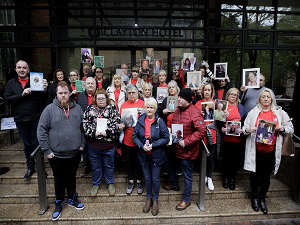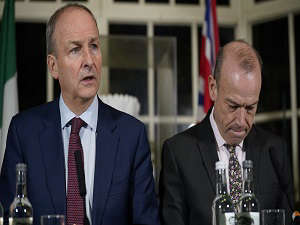
QRadio News
The Prime Minister has called for renewed talks to break Stormont's powersharing impasse as two rows about the legacy of the Troubles emerged as further roadblocks in the way of a deal.
Theresa May urged a further round of negotiations after holding separate meetings with Democratic Unionists and Sinn Fein delegations at Downing Street.
But the prospects of any imminent breakthrough in the eleven month standoff appeared to recede further after DUP leader Arlene Foster exited No 10 claiming Sinn Fein's "glorification of terrorism" was making a deal more difficult.
Mrs Foster was referring to the scenes at Sinn Fein's party conference in Dublin on Saturday when delegates roared their approval when told the late Martin McGuinness was a "proud member of the IRA".
While the DUP was angry about that incident, Sinn Fein emerged from No 10 with its own Troubles related complaint, accusing the Government of adding a proposed amnesty for UK security forces to a public consultation document on potential mechanisms for dealing with the legacy of the conflict.
Sinn Fein president Gerry Adams said the insertion of the statute of limitations proposal, one he said amounted to an "amnesty", was an "act of bad faith" done without the knowledge of his party or the Irish government.
The Prime Minister said she did not underestimate the challenge of striking an agreement to restore devolution, but she said she believed the differences between the two main parties were small and could be resolved.
"I believe it is imperative the parties come back together next week for talks and that we resolve these differences," said Mrs May.
Outside Downing Street, Mrs Foster claimed Sinn Fein was glorifying the murders of innocent people.
"We did say to the Prime Minister that the glorification of terrorism at the weekend at the Sinn Fein conference was making it more difficult to bring around devolution," she said.
"We are talking about a deal unionism and nationalism can live with.
"They are talking about nationalism and that's it."
Emerging after his own meeting with Mrs May, Mr Adams insisted: "I didn't see any glorification of anyone at the Ard Fheis.
"I also, standing outside the office of the British Prime Minister, want to refute the use of this term 'terrorism'.
"Pejorative terms like that, which are about the sons and daughters of families, husbands and wives of families, who happened to serve in the Irish Republican Army and who died in the conflict, I don't use those terms.
"So let's have a wee bit of sense about this."
Asked about the difficulties in striking a deal, Mr Adams added: "I'm too long going in and out of this place to let anything annoy me.
"I understand how change works, it works when those who want change are prepared to engage with those who don't want change and persuade them it is in everybody's interests."
The DUP and other unionists in Northern Ireland have long questioned whether Sinn Fein's reverence for the past actions of the IRA is compatible with building a shared society in the region.
The issue often manifests itself around commemorations for IRA members killed during the conflict.
Sinn Fein insists there are different narratives of what happened during the Troubles and that all sides should be entitled to remember their dead.
Mrs May said both parties had reiterated their commitment to the restoration of devolution during the discussions inside No 10.
"I believe that the differences between the parties, the issues that are still dividing them, are very small," she said.
"I am not underestimating the challenges that lie ahead but I believe that a way forward can be found so agreement can be reached."
Northern Ireland has been without a properly functioning powersharing administration since January.
The institutions imploded when Mr McGuinness quit as deputy first minister amid a row about a botched green energy scheme.
The rift over the renewable heat incentive (RHI) affair exposed a series of more deep-seated issues dividing the region's two largest parties.
One of the key obstacles now standing in the way of a deal is a proposed piece of legislation to protect Irish language speakers in the region.
Multiple Government-set deadlines to form an administration in Belfast have fallen by the wayside and the region is edging toward the re-imposition of direct rule by Westminster.
Northern Ireland Secretary James Brokenshire intervened earlier this month to set a budget for Stormont's rudderless public services.
While Mr Brokenshire insisted the move was not a step on the road to direct rule, many politicians in the region disagreed and characterised it as a huge stride to London taking up the reins of power.


 Investigation into ‘missing’ notes from key Executive meeting
Investigation into ‘missing’ notes from key Executive meeting
 Teenage girl killed in road crash named as Kamile Vaicikonyte
Teenage girl killed in road crash named as Kamile Vaicikonyte
 Covid-19 inquiry ‘an opportunity for candour’ from Stormont leaders
Covid-19 inquiry ‘an opportunity for candour’ from Stormont leaders
 UK and Irish ministers to meet amid row over migration
UK and Irish ministers to meet amid row over migration
 Three men set to go on trial for murder of journalist Lyra McKee
Three men set to go on trial for murder of journalist Lyra McKee